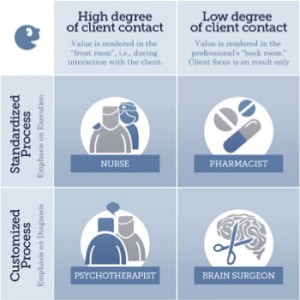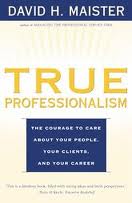This post explains the 4 types of consulting as they are defined by David H. Maister.
Which type of consulting do you provide?
There are many types of consulting. The way you promote your consulting services, the way you generate leads, the way you sell and the way you deliver depend heavily on the type of consulting business you exercise.
A project may often be a mix of various types of consulting services. This is a serious challenge for the individual and independent management consultant. Mastering the many types of consulting services as an individual is simply not possible.
This post explains the 4 types of consulting as they are defined by David H. Maister.
David H. Maister introduced the concept of the 4 types of consulting in his book “True Professionalism” first published in 1997.
The post will review the 4 types of consulting:
- What they are
- Examples of each type of consulting
- The impact on you sales efforts and
- The impact on you delivery infrastructure
Understanding the difference between the 4 types of consulting is critical for any management consultant and understanding them will have a dramatic impact on how you sell and how you deliver your consulting services.
The objectives of this post are:
- Making you familiar with the concept of the 4 types of consulting
- Enable you to identify the needs of your clients
- Enable you to coach your client in the direction required for successful project accomplishment
- Review the impact on the sales process of consulting services
The four types of consulting
The 4 types of consulting is defined using two criteria:
- How close do you have to be to the client when delivering the service?
- To which degree is the process required a standard or customized process?
Using these criteria we get the 4 types of consulting:
We call consulting services following a standard process and where only little client contact is required for “Chemist or Pharmacist” type services
We call consulting services following a standard process and where close client contact is required for “Nursing Type” services
We call consulting services following a customized process and where only little client contact is required for “Brain surgery” type services
We call consulting services following a customized process and where close client contact is required for “Psychotherapist” type services.
Let’s take a closer look at the 4 types.
Pharmacist
The client is looking for a solution to a well defined issue. He knows exactly what the problem is and he is looking for someone to run the process at the best price/performance ratio. This scenario is close to selling and delivering a “product”. The client is familiar with the service and knows the process associated with the delivery. He will probably ask a couple of suppliers for a proposal before he makes his choice.
Samples of pharmacist type of consulting services are:
- Staff recruitment
- Staff profiling
- Strategy review
- Channel recruitment
Nurse
The client knows the problem and also have an idea of the process required to fix it, however he want to be involved all along the way and possibly learn from the process. Start-up companies and younger executives often prefer nursing types services over pharmacist services as they will learn from the process. When they get familiar with the processes they will be better positioned to request the services in a pharmacist format.
Samples of nursing type of consulting services are:
- Channel program development
- Executive recruitment
- Sales training
- Customer satisfaction surveys
- Market assessments
Brain surgeon
The brain surgeon applies high levels of customization, creativity and innovation combined with a low degree of client interaction. The client is looking for a recognized top specialist who can fix an important problem, but he doesn’t feel he needs to be intimately involved in the solution.
Samples of brain surgeon type of consulting services are:
- Tax consulting
- Legal consulting
- Development of P&L models, remuneration schemes and other concepts
- Interim management
Psychotherapist
The psychotherapist is required when the problem is unclear and thus the process required also unclear. This is normally called management consulting. The consultant will help the client analyze the situation and also help the client identify the steps required to provide a remedy. Implementing the remedy can be an opportunity for additional consulting services or the client can decide to perform the implementation with his own resources.
Samples of psychoterapist type of consulting services are:
- Management coaching
- Ambition discovery
- Strategy development
- Value Proposition definition/development
- Investment prospect development
- M&A consulting
Impact on sales
The definition of the 4 types of consulting is based on what the client expresses a need for.
It is your job as sales person to identify and qualify which of the 4 types of consulting services you must propose the client. You do so by asking questions.
An example: Staff recruitment may be a pharmacist type of service. But only if the job description is in place, the success criteria are defined, the reporting structure is decided, the remuneration package is defined, the evaluation scheme is defined and an introduction program is in place. If these fundamental prerequisites are not in place, then a staff recruitment assignment can turn into a combination of all the 4 types of consulting services. We must be able to identify these issues in the conversation with the client.
The same goes for market bootstrapping and channel recruitment. They are also only pharmacist type of services if all the prerequisites are in place.
Obviously there will be many situations where the client is looking for a pill to cure an important, very complicated and ill-defined issue. The client would prefer a cheap pill to quickly fix a problem, which actually requires insight and analysis, then a diagnosis and then a cure. It is your job as a sales person to coach the client and make him understand his own situation and his options.
It is also your job to qualify the client:
Does the client want a pill and a quick fix because he has no money? No money = no project!
Or does the client want a pill and a quick fix because he doesn’t really understand what he is dealing with? Can you coach him into the solution process?
If the clients perception of his situation is matching with you perception and the client is prepared to pay a fair price for consulting assistance then you can go home and prepare your proposal.
If the clients perception of his own situation is not matching with your perception, but the client is prepared to pay a fair price for consulting assistance then you must coach him towards through a solution process.
If the clients perception of his own situation is not matching with you perception and the client is not prepared to pay a fair price for consulting assistance then you must leave the meeting as gracefully as possible (you can always choose to “fight” another day).
Impact on delivery
Understanding the 4 types of consulting will help you become more successful as a consultant. It will also help you with pricing and applying the concept of leverage.
Most consulting assignments are a mixture of the 4 types. It may start out as any of the four types and develop into mixture.
Pharmacist
Pharmacist services must be predefined and offered at competitive prices. To be profitable with chemist type services you must have an infrastructure in place to deliver the service and you must have economy of scale in your operation.
A team of people normally delivers pharmacist type services with well-defined division of labour in the process. Typically there is a senior management consultant responsible for client engagement and a series of specialized clerks and junior staff involved with the execution.
Nurse
Nursing type of services must be also be predefined and offered at competitive prices. However the coaching element allows for above average fees if you can demonstrate domain knowledge and experience with similar type of projects.
To be profitable with nursing type services you must also have an infrastructure in place to deliver the service, but economy of scale is not so critical.
Typically there is a senior management consultant responsible for client engagement and the coaching while a staff of specialized clerks and junior consultants involved with the back-office execution.
Brain Surgeon
Recognized specialist delivers brain surgeon types of consulting. Some leverage may be applied, but the senior consultant will do most of the work. Getting brain surgeon types of assignments requires that you are a recognized specialist in your specific domain. Your clients will already know who you are or you will be recommended by one client to another. Premium fees can be asked.
Psychotherapist
Recognized thought leaders deliver psychotherapist services. Degree of leverage is low, however the psychotherapist will identify other consulting opportunities, which can be referred to other consultants in the organization. Your clients will already know who you are or you will be recommended by one client to another. Premium fees can be asked.
Summary
Each of the 4 types of consulting are all respectable and genuine ways of providing services to client issues. However it is crucial to understand the difference and be able to offer and execute with the right infrastructure and resources.
Making attractive margins on delivering the 4 types of services requires completely different types of consultants and back-office infrastructure setups.
Additional resources
If you are interested in learning more about running a consulting business I urge you to read the books by David Maister.











Pingback: The Three Types of Independent Management Consultants | Helping companies grow
Pingback: Increase your prices - part 1 | Helping companies grow
Pingback: Increase your prices – part 3 | Helping companies grow
Pingback: Increase your prices - part 4 | Helping companies grow
Pingback: Increase your prices - part 7: The deliverables | Helping companies grow
Excellent material and a rare perspective on what the consulting industry should do. I’ve owned a consulting practice for four years and was mostly on track with the viewpoints on your site. I formed my company based on the positive and negative, profitable and unprofitable projects I worked on as a corporate employee in a Fortune 500 company in California. This information was timely and thanks for the referral to David Maister’s materials. I was taught in the Miller Heiman Sales training system. http://www.e-chamberconsutling.com, Rick Nappier (925) 956-7925, California, USA.
Pingback: Management Consulting: The Quest for Certainty | Helping companies grow
Pingback: The Three Types of Independent Management Consultants | TBK Holding
Pingback: Management Consulting Essentials: Positioning | TBK Holding
Pingback: Why consultants MUST pre-qualify potential clients | TBK Holding
Pingback: The First Meeting is not about selling | TBK Holding
Pingback: Hvordan kunder køber - og hvorfor de ikke gør - Ord skaber følelser - følelser styrer adfærd
Pingback: How Customers Buy… And Why They Don’t: Mapping and Managing the Buying Journey DNA - TBK Consult